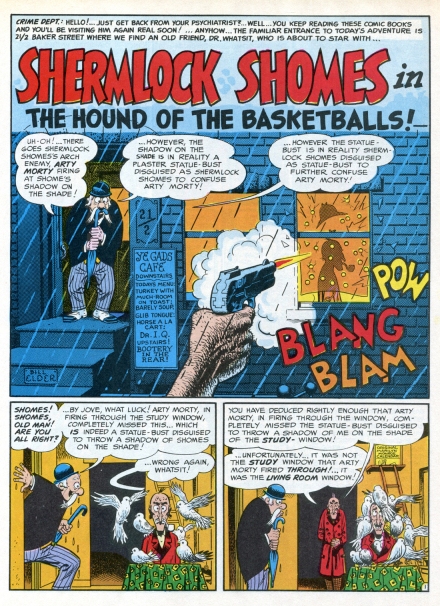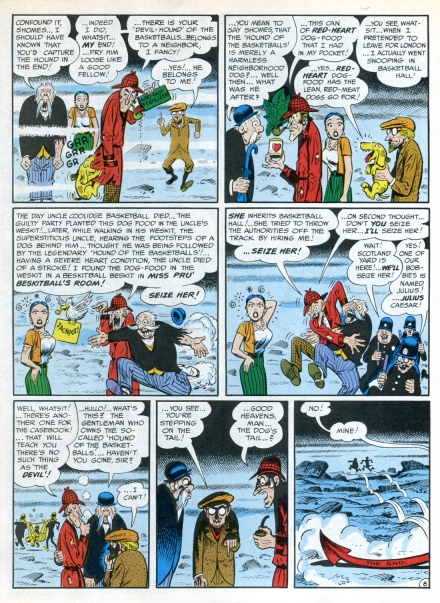 Mad is an American humor magazine
founded by editor Harvey Kurtzman and publisher William Gaines in 1952. Launched as a comic book before it became a magazine, it was widely imitated and influential, impacting not only satirical media but the entire cultural landscape of the 20th century, with editor Al Feldstein increasing readership to more than 2,000,000 during its 1970s circulation peak.
The last surviving title from the notorious and critically acclaimed EC Comics line, the magazine offers satire on all aspects of life and popular culture, politics, entertainment, and public figures. Its format is divided into a number of recurring segments such as TV and movie parodies, as well as freeform articles. Mad's mascot, Alfred E. Neuman, is typically the focal point of the magazine's cover, with his face often replacing a celebrity or character that is lampooned within the issue.
In 2010, the magazine's oldest and longest-running contributor, Al Jaffee, told an interviewer, "Mad was designed to corrupt the minds of children. And from what I'm gathering from the minds of people all over, we succeeded."
Debuting in August 1952 (cover date October–November), Mad began as a comic book published by EC, located in lower Manhattan at 225 Lafayette Street. In the early 1960s, the Mad office moved to 485 Madison Avenue, a location given in the magazine as "485 MADison Avenue". The title is trademarked in capitals as MAD.
Written almost entirely by Harvey Kurtzman, the first issue featured illustrations by Kurtzman himself, along with Wally Wood, Will Elder, Jack Davis and John Severin. Wood, Elder and Davis were the three main illustrators throughout the 23-issue run of the comic book.
To retain Kurtzman as its editor, the comic book converted to magazine format as of issue (1955). The switchover only induced Kurtzman to remain for one more year, but crucially, the move had removed Mad from the strictures of the Comics Code Authority. After Kurtzman's departure in 1956, new editor Al Feldstein swiftly brought aboard contributors such as Don Martin, Frank Jacobs and Mort Drucker, and later, Antonio Prohías and Dave Berg. The magazine's circulation more than quadrupled during Feldstein's tenure, peaking at 2,132,655 in 1974; it later declined to a third of this figure by the end of his time as editor. When Feldstein retired in 1984, he was replaced by the team of Nick Meglin and John Ficarra, who co-edited Mad for the next two decades. Since Meglin's retirement in 2004, Ficarra has continued to edit the magazine.
Gaines sold his company in the early 1960s to the Kinney Parking Company, which also acquired National Periodicals (aka DC Comics) and Warner Bros. by the end of that decade. Gaines was named a Kinney board member, and was largely permitted to run Mad as he saw fit without corporate interference.
Following Gaines's death, Mad became more ingrained within the Time Warner corporate structure. Eventually, the magazine was obliged to abandon its long-time home at 485 Madison Avenue, and in the mid-1990s it moved into DC Comics' offices at the same time DC relocated to 1700 Broadway. In 2001, the magazine broke its long-standing taboo and began running paid advertising. The outside revenue allowed for the introduction of color printing and improved paper stock.
In its earliest incarnation, new issues of the magazine appeared erratically, between four and seven times a year. By the end of 1958, Mad had settled on an unusual eight-times-a-year schedule, which lasted almost four decades. Gaines felt the atypical timing was necessary to maintain the magazine's level of quality. Mad then began producing additional issues, until it reached a traditional monthly schedule with the January 1997 issue. With its 500th issue (June 2009), amid company-wide cutbacks at Time Warner, the magazine temporarily regressed to a quarterly publication before settling to six issues per year in 2010.
Mad is an American humor magazine
founded by editor Harvey Kurtzman and publisher William Gaines in 1952. Launched as a comic book before it became a magazine, it was widely imitated and influential, impacting not only satirical media but the entire cultural landscape of the 20th century, with editor Al Feldstein increasing readership to more than 2,000,000 during its 1970s circulation peak.
The last surviving title from the notorious and critically acclaimed EC Comics line, the magazine offers satire on all aspects of life and popular culture, politics, entertainment, and public figures. Its format is divided into a number of recurring segments such as TV and movie parodies, as well as freeform articles. Mad's mascot, Alfred E. Neuman, is typically the focal point of the magazine's cover, with his face often replacing a celebrity or character that is lampooned within the issue.
In 2010, the magazine's oldest and longest-running contributor, Al Jaffee, told an interviewer, "Mad was designed to corrupt the minds of children. And from what I'm gathering from the minds of people all over, we succeeded."
Debuting in August 1952 (cover date October–November), Mad began as a comic book published by EC, located in lower Manhattan at 225 Lafayette Street. In the early 1960s, the Mad office moved to 485 Madison Avenue, a location given in the magazine as "485 MADison Avenue". The title is trademarked in capitals as MAD.
Written almost entirely by Harvey Kurtzman, the first issue featured illustrations by Kurtzman himself, along with Wally Wood, Will Elder, Jack Davis and John Severin. Wood, Elder and Davis were the three main illustrators throughout the 23-issue run of the comic book.
To retain Kurtzman as its editor, the comic book converted to magazine format as of issue (1955). The switchover only induced Kurtzman to remain for one more year, but crucially, the move had removed Mad from the strictures of the Comics Code Authority. After Kurtzman's departure in 1956, new editor Al Feldstein swiftly brought aboard contributors such as Don Martin, Frank Jacobs and Mort Drucker, and later, Antonio Prohías and Dave Berg. The magazine's circulation more than quadrupled during Feldstein's tenure, peaking at 2,132,655 in 1974; it later declined to a third of this figure by the end of his time as editor. When Feldstein retired in 1984, he was replaced by the team of Nick Meglin and John Ficarra, who co-edited Mad for the next two decades. Since Meglin's retirement in 2004, Ficarra has continued to edit the magazine.
Gaines sold his company in the early 1960s to the Kinney Parking Company, which also acquired National Periodicals (aka DC Comics) and Warner Bros. by the end of that decade. Gaines was named a Kinney board member, and was largely permitted to run Mad as he saw fit without corporate interference.
Following Gaines's death, Mad became more ingrained within the Time Warner corporate structure. Eventually, the magazine was obliged to abandon its long-time home at 485 Madison Avenue, and in the mid-1990s it moved into DC Comics' offices at the same time DC relocated to 1700 Broadway. In 2001, the magazine broke its long-standing taboo and began running paid advertising. The outside revenue allowed for the introduction of color printing and improved paper stock.
In its earliest incarnation, new issues of the magazine appeared erratically, between four and seven times a year. By the end of 1958, Mad had settled on an unusual eight-times-a-year schedule, which lasted almost four decades. Gaines felt the atypical timing was necessary to maintain the magazine's level of quality. Mad then began producing additional issues, until it reached a traditional monthly schedule with the January 1997 issue. With its 500th issue (June 2009), amid company-wide cutbacks at Time Warner, the magazine temporarily regressed to a quarterly publication before settling to six issues per year in 2010.
(en.wikipedia.org)








